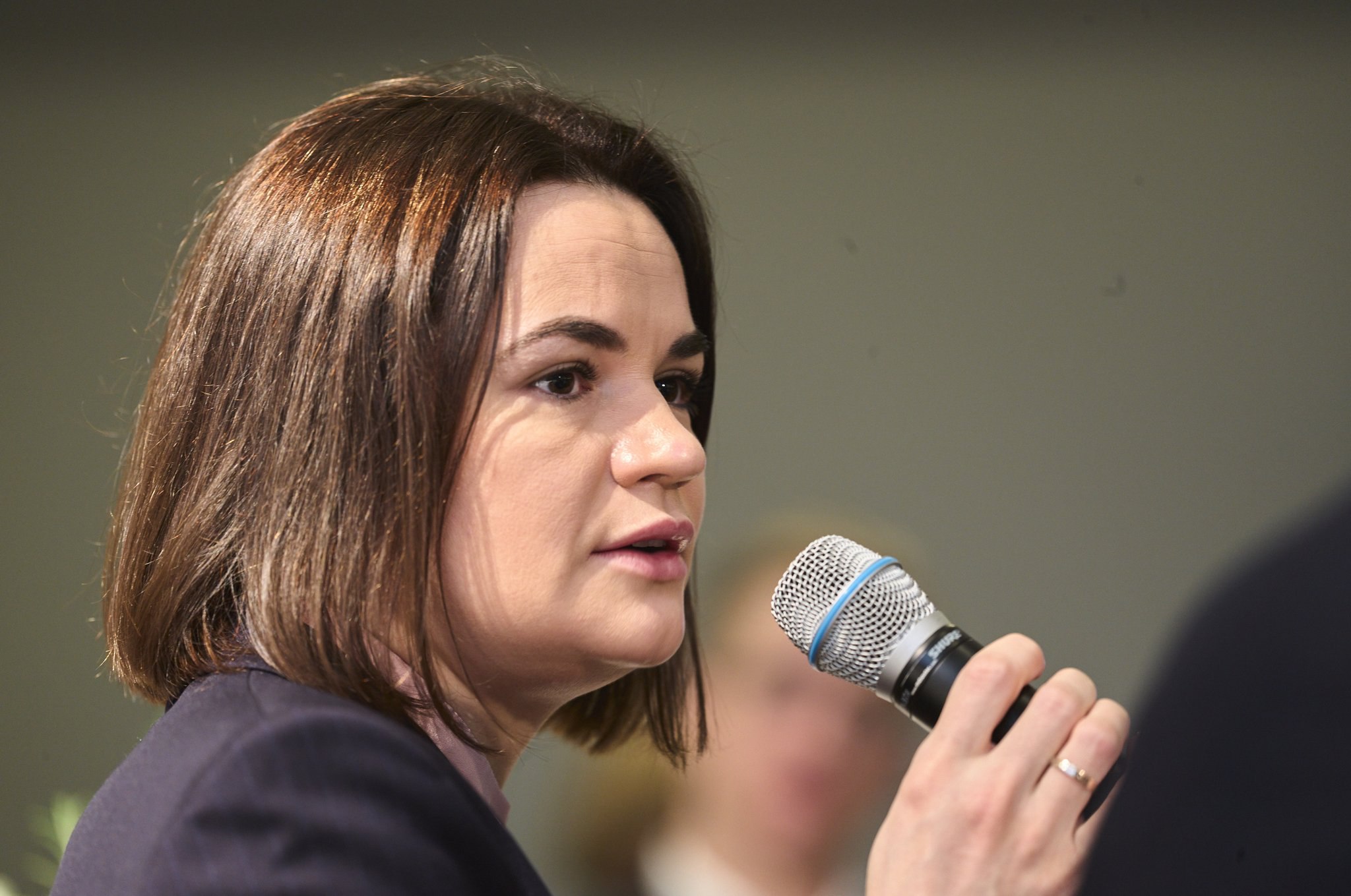On the morning of February 19, on the sidelines of the Munich Security Conference, Sviatlana Tsikhanouskaya spoke at the discussion on strengthening democracies. Among other speakers were Estonian Prime Minister Kaja Kallas and Kosovo President Vjosa Osmani. In her address, leader of democratic Belarus outlined the necessary pillars in the struggle against dictatorships: 1) putting people first, as they are the ones who should decide; 2) staying united and resolving the divisions; 3) giving up the attempts to re-educate or appease the dictator; 4) looking for cracks in the system; 5) refusing from habitat measures, as they only do harm, like in the case of sanctions on Belarus.
Then, Sviatlana Tsikhanouskaya spoke at the panel discussion on Belarusian culture, joined by Belarusian writer Sasha Filipenko and German Minister for Culture and Media Claudia Roth. Ms. Tsikhanouskaya noted the importance of culture and solidarity for building a self-sustaining civil society, thanked the Belarusian Council for Culture and all initiatives working in this area. She noted that culture is one of the major drivers of the Belarusian struggle for change.
On the sidelines of the MSC, Ms. Tsikhanouskaya had a short conversation with Speaker of the US House of Representatives Nancy Pelosi, one of the most powerful women in the United States and world. Sviatlana Tsikhanouskaya spoke about the situation in Belarus, Pelosi conveyed wishes of good luck and courage to all Belarusians.
Then, the Belarusian leader had an extensive discussion with US senators – Jeanne Shaheen, Rob Portman, Chris Coons, Dan Sullivan, Richard Durbin, Chris Van Hollen, Ben Sasse, Joni Ernst, Lindsey Graham, Sheldon Whitehouse, former senator Joseph Lieberman. Ms. Tsikhanouskaya noted the importance of not only the non-recognition of Lukashenka, but also of a mechanism to make all his decisions and deals illegal. She also asked for help in bringing the perpetrators of the crimes to justice through international courts.
For the first time, leader of democratic Belarus met with the Mayor of Istanbul. Ekrem Imagoglu is in opposition to Recep Erdogan's party in Turkey. Ms. Tsikhanouskaya invited Imamoglu to visit Minsk when it is possible. They also discussed the possibilities for cooperation with new Belarus, the migration crisis, tourism from Belarus, and the Ukrainian-Russian conflict.
Then, Ms. Tsikhanouskaya took part in a discussion on Ukraine, which was joined by Ukrainian Foreign Minister Dmytro Kuleba, deputies of the Verkhovna Rada of Ukraine, and a number of ministers and officials. Sviatlana Tsikhanouskaya addressed Ukrainians and said that “the fate of Belarus depends on the fate of Ukraine and vice versa”. She stressed that Lukashenka is deliberately trying to drive a wedge between Belarusians and Ukrainians.
At Sviatlana Tsikhanouskaya’s meeting with Bulgarian Foreign Minister Teodora Genchovska, they discussed the possible rehabilitation for the families of political prisoners and those who are released after serving their sentences. They also talked about the 6th package of the EU sanctions, which will be considered on Monday in Brussels.
In a conversation with the American Jewish Committee CEO, David Harris, Sviatlana Tsikhanouskaya drew attention to Lukashenka's repeated anti-Semitic statements and noted that Belarusians have nothing to do with these statements. She also spoke about the situation with Jewish organizations in Belarus, which are under constant pressure from the regime.
On February 19, Ms. Tsikhanouskaya also met with Prime Minister of Kosovo Albin Kurti. She thanked Kosovo for the latest package of sanctions, which has an immense symbolic value, showing the unity of Europe and respect for democratic values.
In a conversation with Swedish Foreign Minister Ann Linde, Ms. Tsikhanouskaya raised the issue of Swedish assistance to Belarus, which used to be provided through state institutions but is now frozen. The Belarusian leader stressed that the media, human rights activists, and volunteers continue their daily fearless work and need the support that Sweden could provide.
In her official address at the Munich Conference, Ms. Tsikhanouskaya drew attention to the regime’s lack of independence in decision-making and urged everyone to finally stop recognizing it, doing business or politics with it. At the same time, it is important to appeal to Belarusians, businesses, companies, and officials who support changes in Belarus. “The regime is weak, but no one can predict how the situation will develop. We need to look for like-minded people, including among the people of the regime”, Ms. Tsikhanouskaya said. She also noted that February 20, is landmark day to see whether the withdrawal of Russian troops from Belarus begins.
With Danish Foreign Minister Jeppe Kofod, Sviatlana Tsikhanouskaya discussed sanctions, as well as the international platform for collecting evidence of the regime's crimes. Denmark actively supports Belarus in international organizations, helps a number of initiatives and the Belarusian diaspora.
Norwegian Foreign Minister Anniken Huitfeldt invited Ms. Tsikhanouskaya to Oslo with a working visit. They discussed the issue of Yara that used to buy Belaruskali products and assistance to human rights defenders. They also touched upon the possibility of organizing hearings in the UN Security Council, as Norway is a non-permanent member of the Council.
Within the Munich Security Conference, Sviatlana Tsikhanouskaya also met with the CFO of BMW and the leadership of the BMW Foundation.
On the sideline of the MSC, Ms. Tsikhanouskaya spoke with Canadian Foreign Minister Melanie Joly. That was their first meeting. Canada has been one of the most determined states in non-recognition of Lukashenka, imposing sanctions, and providing assistance to Belarusian civil society. Canada supports women's initiatives, researchers, Belarusian media. Leader of democratic Belarus spoke about the situation with political prisoners amidst the regional crisis. Minister Jolie and Ms. Tsikhanouskaya discussed the possibilities for cooperation and joint actions in international organizations.








